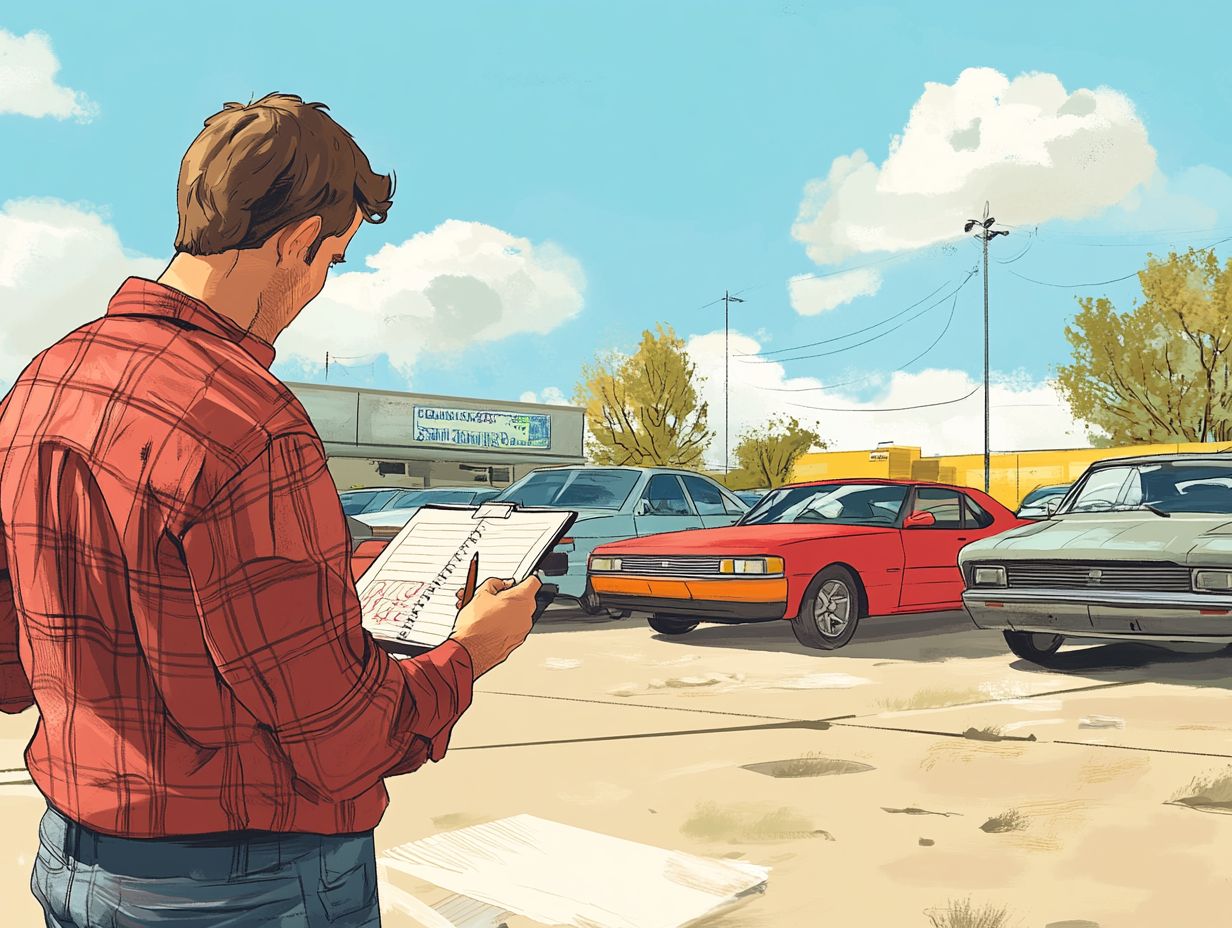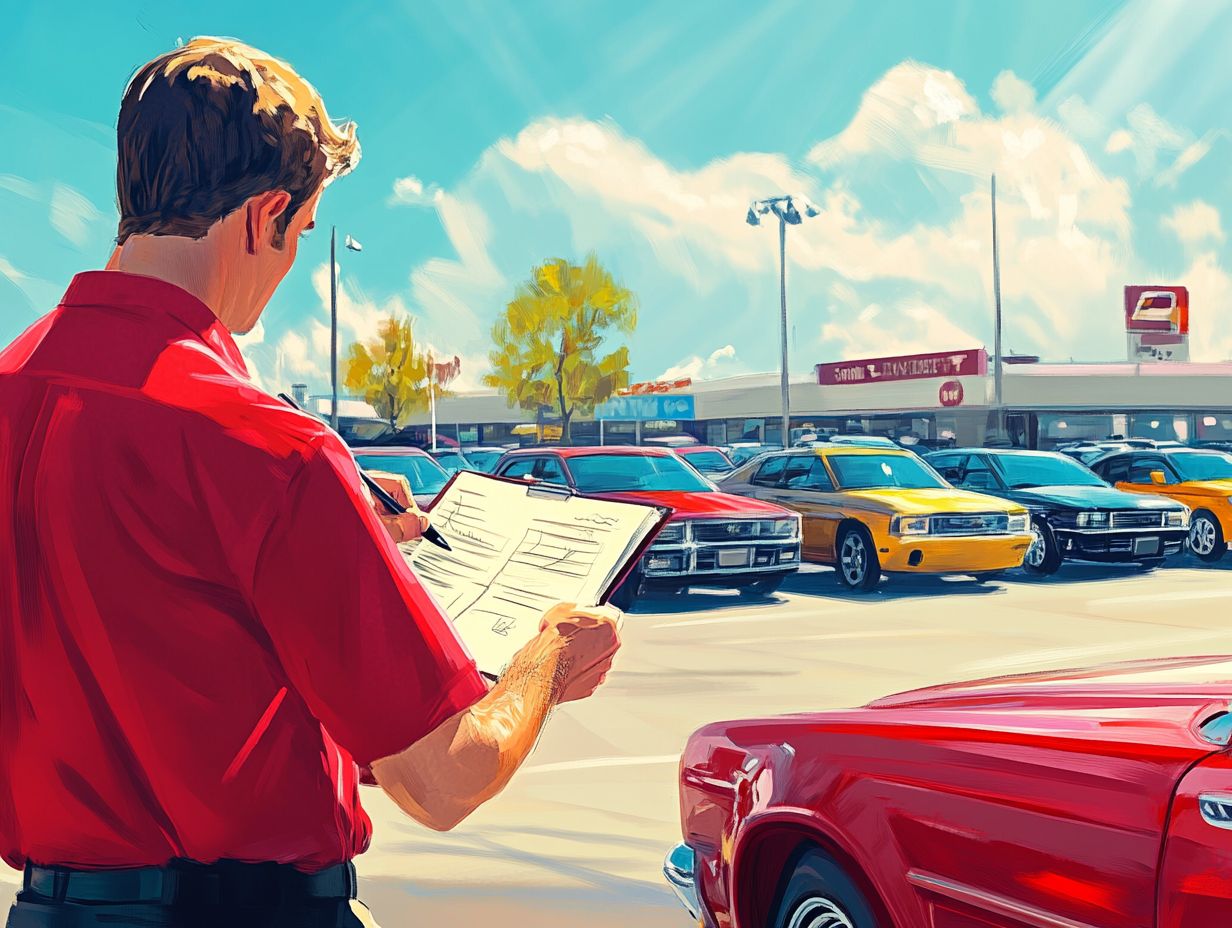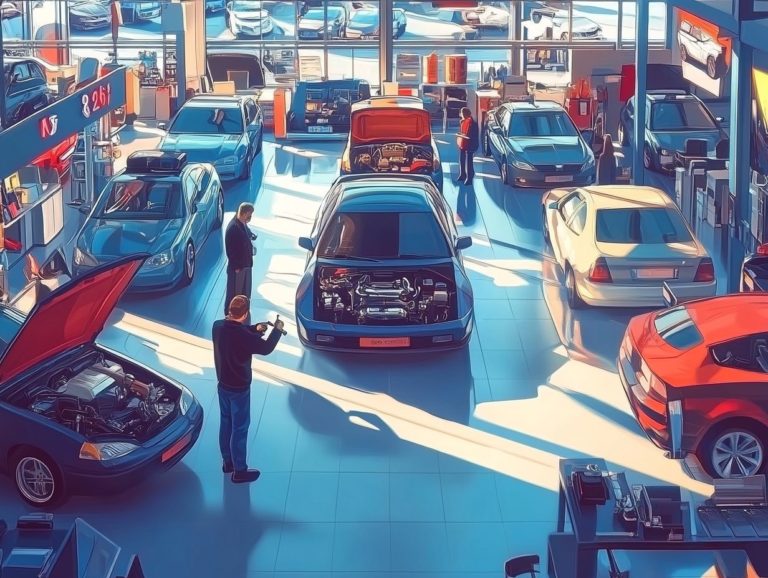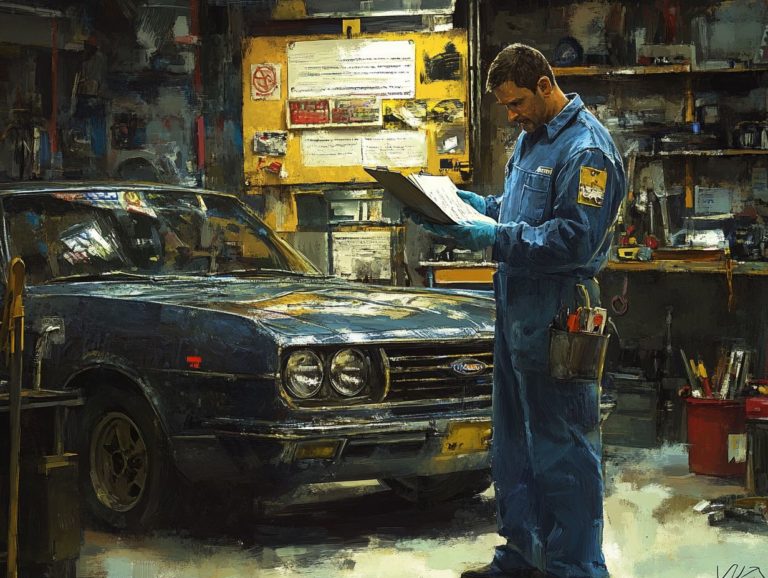5 Ways to Save Money on a Used Car Purchase
Buying a used car can feel like a thrilling adventure, but it can also present its share of challenges, given the multitude of options and factors to weigh.
Whether you re a savvy buyer or just starting out, knowing how to save money while securing a dependable vehicle is essential. Ready to score an amazing deal?
This article dives into five key strategies to help you navigate the used car market intelligently. You ll learn about doing your homework, setting a budget, negotiating prices, and assessing vehicle history.
You ll also learn about the benefits of buying used cars and how to avoid common mistakes. Let s dive in!
Contents
- Key Takeaways:
- 1. Do Your Research
- 2. Set a Budget
- 3. Consider Different Makes and Models
- 4. Get a Vehicle History Report
- 5. Negotiate the Price
- What Are the Benefits of Buying a Used Car?
- Preguntas Frecuentes
- Cu les son las 5 mejores maneras de ahorrar dinero al comprar un coche usado?
- Es mejor pagar en efectivo o financiar la compra de un coche usado?
- Los coches certificados de segunda mano valen el costo adicional?
- Puedo ahorrar dinero comprando un coche de otro estado?
- Qu debo buscar al probar un coche usado?
- C mo puedo evitar comprar un coche con problemas al comprar un coche usado?
Key Takeaways:

Do your research to find the best deals on used cars. Set a budget and stick to it when looking at options. Explore different makes and models to find the best fit for your needs and budget. Additionally, be aware of the top 7 mistakes to avoid when buying used cars to ensure you don’t miss out on the best deals!
1. Do Your Research
Doing your homework is the cornerstone of a successful car purchase. It gives you the power to save money by making informed decisions about financing options, dealership prices, and the total price of the vehicle, whether it’s new or used.
Utilizing resources like Kelley Blue Book, a trusted resource for car values and pricing, and Consumer Reports can significantly enhance your research process. These tools provide invaluable insights into vehicle market values, giving you a clearer picture of fair pricing.
You can compare specifications, reliability ratings, and customer reviews, which are crucial for assessing different models. Exploring financing options through credit unions and online lenders allows you to compare different loan options, helping you find the most favorable arrangements tailored to your financial situation.
By combining these elements, you can navigate the car-buying landscape with confidence, ensuring a well-rounded and satisfying purchase experience.
2. Set a Budget
Setting a budget is an essential step in your car-buying journey. It allows you to outline your monthly payments and make informed financial decisions, ensuring you stay within your budget while also considering additional costs like insurance and maintenance.
To craft a comprehensive budget, evaluate various factors, including potential insurance quotes from reputable companies such as Geico or Farmers Insurance. These can significantly impact your monthly expenses.
Long-term costs, like car depreciation, play a crucial role in understanding the vehicle’s overall financial impact. Don’t overlook the routine maintenance expenses that can accumulate over time.
Utilizing budgeting tools and prequalification resources for loans can streamline this process. These tools provide you with clarity and help you make well-informed financial choices, ensuring a well-rounded approach to managing both your immediate and future expenditures.
3. Consider Different Makes and Models
When considering a car purchase, it’s crucial for you to explore different makes and models. This exploration helps you grasp the various vehicle types, their features, and the differences in pricing and overall value.
To navigate this process effectively, turn to reputable resources like Edmunds and Kelley Blue Book. These platforms offer comprehensive reviews and comparisons, along with insights on reliability, fuel efficiency, and resale value for various models truly invaluable for any discerning buyer.
By weighing the pros and cons of each vehicle like a sedan’s comfort against an SUV’s capacity you’ll be equipped to make informed choices that align with your unique needs. Delving into owner feedback and expert ratings will further illuminate potential pitfalls or highlights of specific makes.
Ensuring you have a well-rounded understanding before making that all-important purchase is key!
Begin your search today and find the perfect used car for you!
4. Get a Vehicle History Report

Obtaining a vehicle history report is an essential step in your journey to buy a used car. This report unveils critical information regarding the vehicle’s value, previous accidents, and potential maintenance costs, empowering you to make an informed decision and shield yourself from unexpected expenses, such as gap insurance.
These reports typically provide valuable insights into the car’s past ownership, revealing how many drivers have been behind the wheel and whether the vehicle has received the care it deserves. They also highlight any recorded accidents, which can significantly impact both safety and future repair costs.
Reputable services like Carfax and AutoCheck are renowned for their thorough reports that cover these vital aspects and more. With this knowledge in hand, you can negotiate better prices and steer clear of cars with hidden issues. This ensures that your investment serves you well for years to come.
5. Negotiate the Price
Effective price negotiation is an essential skill for you as a car buyer. It allows you to leverage pricing guides and dealership prices to secure the best possible deal, whether you choose dealer financing or external financing options with favorable credit terms.
To manage this process easily, you need to do some research first. By examining various pricing guides, you ll gain a solid understanding of the fair market value of your desired vehicle. This knowledge empowers you and adds credibility to your discussions.
When the negotiation kicks off, adopting a confident yet respectful demeanor can significantly enhance your chances of securing a better offer. Being prepared to counter the dealer s initial price with insights from online resources can shift the balance of power in your favor.
Staying firm within your budget is paramount, as this discipline keeps negotiations grounded and helps you avoid financial overextension!
What Are the Benefits of Buying a Used Car?
Buying a used car presents a wealth of advantages, including significantly reduced depreciation costs, lower monthly payments, and often more budget-friendly insurance quotes. To make the most of this decision, it’s essential to understand how to prepare for a used car purchase. This choice is particularly appealing for those who are mindful of their finances, including budget-conscious consumers and first-time buyers eager to navigate the intricacies of car ownership without straining their wallets!
When you choose a pre-owned vehicle, you often find models that are just a couple of years old. This means you can relish many modern features without the steep price tag that comes with brand-new cars. This savvy choice keeps your monthly expenses in check and protects you from the steep depreciation that new cars suffer the moment they roll out of the showroom.
Securing better insurance premiums is another great benefit, as their lower overall value can translate to significant savings on coverage. Ultimately, this strategic approach can lead to substantial financial relief, freeing up funds that you can redirect toward maintenance, fuel, or even upgrading your vehicle in the future.
What Are the Different Types of Used Cars Available?
When exploring the used car market, you ll find an array of options, from sedans and SUVs to trucks and hybrids. Each type boasts unique features and price points, designed to meet diverse consumer needs and preferences. Therefore, it s crucial to conduct thorough research and grasp their market value before making that purchase.
For example, sedans are often favored by those prioritizing fuel efficiency and a comfortable commute. In contrast, SUVs appeal to families and adventure enthusiasts seeking spacious interiors and off-road capabilities. If you require robust towing capacity and durability for heavy-duty tasks, trucks are the way to go. Meanwhile, hybrids attract eco-conscious buyers eager to minimize their carbon footprint without compromising on performance.
To streamline your buying journey, numerous car-buying apps and online tools have emerged. These resources enable you to assess market value, access vehicle history reports, and effortlessly compare options, empowering you to make well-informed decisions that align with your needs.
What Are the Key Factors to Consider When Buying a Used Car?

When you’re in the market for a used car, there are several key factors to keep in mind. You should think about the vehicle’s value, potential maintenance costs, and financing options. Additionally, using 7 tips for effective car negotiation can significantly shape the overall affordability and satisfaction of your purchase.
As you navigate this process, pay attention to elements like the car’s age and mileage. These often reveal its wear and tear. Reliability ratings can offer valuable insights into long-term performance and maintenance requirements.
It s also essential to delve into the vehicle’s history to check for any previous accidents or significant repairs. These could hint at future issues. Engaging in thorough research not only helps you identify a trustworthy vehicle but also allows you to explore financing options.
Whether you’re looking through reputable dealerships or credit unions, you’ll find solutions that cater to various budgets and credit scenarios.
What Are the Common Mistakes to Avoid When Buying a Used Car?
Many buyers often stumble into common pitfalls when purchasing a used car, such as skimping on research, neglecting to factor in total ownership expenses, and underestimating the art of haggling. To avoid these mistakes, it’s helpful to understand how to approach a used car purchase, as these decisions could lead to financial regrets down the line.
You risk ending up with a lemon by overlooking vital vehicle history reports. This could lead to issues that result in expensive repairs later. Ignoring maintenance costs or failing to consider insurance can inflate the true cost of ownership.
To steer clear of these traps, it s crucial to negotiate assertively. Present your research findings as leverage to help drive down the price. Understanding local market rates can give you a significant advantage during discussions.
Armed with knowledge and a well-defined budget, you can sidestep costly missteps and ensure a much more rewarding purchase experience.
How Can a Person Finance a Used Car Purchase?
Financing a used car purchase opens the door to a variety of options, including auto loans, credit union offers, and preapproved loans. Preapproved loans are those that have been tentatively approved based on your financial background, giving you a clearer picture of what you can afford. Each choice comes with its own set of benefits and considerations that you should evaluate carefully to make informed financial decisions.
Traditional loans are a popular route, often available from banks or online lenders. They offer flexibility in terms and competitive interest rates. Dealer financing can be tempting with its convenient on-the-spot approvals and special promotions. However, it’s vital to compare these rates against other options to ensure you’re truly getting the best deal.
Credit unions often provide attractive rates and lower fees, making them an appealing choice for many buyers. Regardless of the option you choose, it’s essential to assess all available interest rates and loan terms.
Utilizing prequalification tools can help you gain clarity on your finance options, empowering you to secure a deal that aligns perfectly with your budget. Explore your options today to find the best financing plan for your needs!
What Are the Maintenance Costs for a Used Car?
Understanding the maintenance costs tied to a used car is crucial for you as a buyer. These expenses can greatly impact the overall value of the vehicle. Take action now to factor these costs into your budget to avoid surprises down the road!
Routine servicing think oil changes, tire rotations, and brake inspections represents the everyday costs you should budget for to keep your vehicle reliable and safe. But don’t overlook the potential for unforeseen repairs, which can emerge from general wear and tear or the occasional mishap.
These unexpected expenses can create significant financial hurdles and even affect your insurance quotes. Insurers tend to evaluate a car s reliability and potential repair costs. Thus, it’s important for you to maintain a vigilant eye on your overall budget.
Make sure to set aside enough funds not just for your regular maintenance but also for those surprises that can pop up with a used vehicle. For more tips, check out this guide on how to find the best used car deals.
Preguntas Frecuentes

Cu les son las 5 mejores maneras de ahorrar dinero al comprar un coche usado?
-
Haz tu investigaci n. Conoce la marca, modelo y a o del coche que te interesa.
Esto te dar una idea del precio promedio y te ayudar a negociar un mejor trato.
-
Considera comprar a un vendedor privado.
Generalmente, los precios son m s bajos comparados con los concesionarios.
-
Obt n una revisi n por un mec nico antes de comprar.
Esto podr a salvarte de costosas sorpresas m s adelante.
-
Negocia el precio. Usa tu investigaci n como herramienta.
No temas discutir cualquier problema que encuentres.
-
Compra en el momento adecuado.
Las ventas de fin de a o pueden ofrecerte un mejor trato.
Es mejor pagar en efectivo o financiar la compra de un coche usado?
Depende de tu situaci n financiera. Pagar en efectivo ahorra en intereses, pero financiar puede ayudarte a construir cr dito. Eval a tu presupuesto y tus metas antes de decidir.
Los coches certificados de segunda mano valen el costo adicional?
Los coches certificados han pasado por una exhaustiva inspecci n y suelen incluir garant a. Son m s seguros que los coches usados normales, pero verifica si se ajustan a tu presupuesto.
Puedo ahorrar dinero comprando un coche de otro estado?
Puede ser posible. Los estados tienen tasas impositivas diferentes, pero considera costos adicionales por transporte y registro.
Qu debo buscar al probar un coche usado?
Presta atenci n a c mo se maneja y a cualquier ruido extra o.
Aseg rate de que las funciones, como el aire acondicionado y la radio, funcionen correctamente.
C mo puedo evitar comprar un coche con problemas al comprar un coche usado?
Realiza una inspecci n exhaustiva y considera la revisi n de un mec nico de confianza.
Verifica el informe hist rico y estudia el modelo por problemas comunes.
Compra a un vendedor de buena reputaci n o un coche certificado para mayor tranquilidad.
No esperes m s! Comienza tu b squeda de un coche usado ahora mismo.






